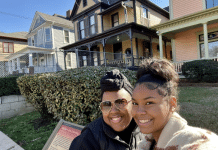As a child of immigrants, the Fourth of July was just another day. I didn’t start celebrating it until high school when my American friends’ traditions became mine. I knew it was a day to celebrate our country’s independence, but I didn’t think too deeply about it. Like everyone else, I enjoyed the day off from school, ate yummy barbecue, and marveled at spectacular fireworks.
I attended a predominantly white, suburban high school. None of us learned the full truth about America’s history from our teachers; the watered-down versions of events were subjective and racially biased. My college courses gave me a wider view and a clearer picture of America’s past.
I learned that on America’s Independence Day in 1776, Black people, my people, were not free. Slavery was legal in the 13 colonies, meaning 20 percent of the population was held captive. There was no freedom or liberty, and they certainly were not considered “equal,” as the Declaration of Independence claimed “all men” were.
Black people played an instrumental, yet overlooked, role in our country’s independence from Britain. Five thousand brave Black men were key in leading America to victory. After they helped win the war for America, many of them were thrown back into enslavement.
Thomas Jefferson, the primary drafter of the Declaration, enslaved 175 Black women, men, and children in 1776 and 267 by 1822. Of the 56 white male property owners who signed the document, 27 were enslavers. None of this sounds worthy of celebrating to me.
So, what do I do with this information? Do I stop celebrating? Am I less American than my white friends?
What image pops into your head when you think of “all-American?” I doubt if it’s a family like mine. My children are second-generation Americans, and our family’s hues range from smooth caramel to rich chocolate. My husband and I have the stereotypical American dream: thriving careers, a lovely home, three amazing kids, and a dog. Why aren’t we seen as all-American?

For me and many other Americans, the Fourth of July represents some ugly truths hidden in our historical fabric. I have a complicated relationship, not only with this holiday but with our country. I love America. But loving something doesn’t mean accepting the flaws and failures. It is because of that love that I want us to be better.
I acknowledge and appreciate the action steps America has taken to improve. However, we have a long way to go. I stopped saying the pledge of allegiance when Trayvon Martin’s killer was acquitted. I can’t recite something that isn’t true. There isn’t always liberty and justice for all of us. We are still waiting for Black lives to matter in this country.
On June 19th, my family celebrated Juneteenth, a national holiday many Black Americans have adopted as our Independence Day. It is our true Freedom Day, when slavery was abolished in all states. It’s bittersweet, yet beautiful, to realize that there is more than one way to celebrate independence in America.
Do I have to choose? I’m not going to. I’m celebrating both Independence Days this year. Similar to my perspective on Thanksgiving, I am using July 4th as a day of reflection about what this day in history really meant. I’ll honor the 5,000 Black soldiers who fought for our country against Great Britain. I’ll celebrate my parents, two immigrants from Jamaica, who earned master’s degrees and doctorates on American soil.
Frederick Douglass’ famous speech, “What, to the Slave, is the Fourth of July?” will always come to mind today. I often reflect on what this holiday means to me as a Black woman. In 1776, my people were not free. In fact, they were fighting for freedom, liberty, and justice, the same rights that many of us are still fighting for.
Although complicated, America is ours, too. My beautiful Black family will sing karaoke, eat barbecue and watch fireworks today. We will enjoy all the freedom and liberties that those before us couldn’t. We will honor them and strive to improve with each generation. This holiday wasn’t made for my ancestors, but I am my ancestors’ wildest dreams.








